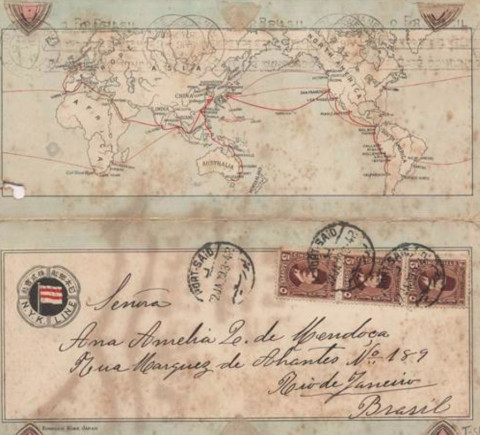The archival collections of nine historic women from Brazil have been made openly accessible by the Fundação Getulio Vargas in Rio de Janeiro, Brazil with financial support from the Center for Research Libraries. These collections contain more than 35,000 images curated by the Centro de Pesquisa e Documentação de História Contemporânea do Brasil (Center for Research and Documentation of Contemporary History of Brazil), which is part of the Fundação Getulio Vargas.
The women included in this collection are:
- Almerinda Farias Gama (1899-1992) - Lawyer, journalist, advocate for women's right to vote
- Anna Amélia de Queiroz Carneiro de Mendonça (1896-1971) - Poet, president of Brazilian Education Association, represented Brazil in 1942 at the Inter-American Commission of Women
- Delminda Benvinda Gudolle Aranha (1894-1969) - President of Comitê de Auxílio às Famílias das Vítimas de Atentados do Eixo, which supported Brazil's involvement in World War II against the Axis powers, wife of diplomat Osvaldo Aranha
- Hermínia de Souza e Silva Collor (1895-1971) - Head of women's wing of Partido Republicano Castilhista; advocate for women's education and literacy
- Hilda Von Sperling Machado - Diplomat and active in civil society groups helping the needy
- Luiza de Freitas Valle Aranha (1872-1948) - Ranch owner, worked on community projects tackling social inequality and in support of health initiatives
- Niomar Moniz Sodré Bittencourt (1916-2003) - Journalist and owner of newspaper Correio da Manhã, one of the founders of Museum of Modern Art in Rio de Janeiro
- Rosalina Coelho Lisbôa de Larragoiti (1900-1975) - Journalist and Brazil's delegate to United Nations General Assembly in 1951
- Yvonne Maggie de Leers Costa Ribeiro (1944- ) - Anthropologist and professor at Rio de Janeiro Federal University
As noted by the Center for Research and Documentation of Contemporary History of Brazil (CPDOC), "The history of Brazil has given little visibility to the history of women and their achievements. The archive of Almerinda Farias Gama is important for recording the political performance of a black woman, her struggle in favor of the female vote and the economic independence of women. The right to vote, acquired by women like Anna Amelia and Almerinda, was consolidated in the history of Brazil by the decree of President Getúlio Vargas, of 1932. The participation of women in the conquest for this right was erased from history. The digitization of their archives is an important step in highlighting these trajectories." In 2015, due to the notable gap in the historical record of women's archives in Brazil, the CPDOC updated its archival policy to express its intent to collect archives about women.
CRL and Fundação Getulio Vargas collaborated on the identification of relevant source material through CRL's Global Collections Initiative, a cooperative effort to expand electronic access to primary source materials and data for area and international studies.



